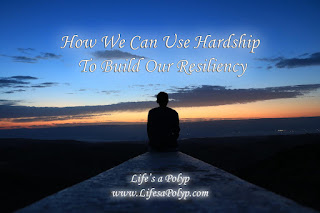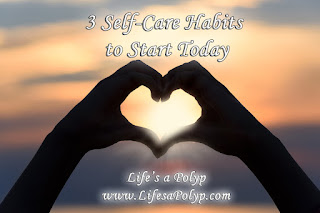I attended a seminar on Cognitive Behavioral Therapy (CBT) for Chronic Pain. It was extremely enlightening and helpful in understanding additional methods to increase quality of life with chronic pain. I have been seeing more articles and information about mental health being included in the management for chronic pain but haven't had the opportunity to yet complete a deep dive on all the information I've found. This idea of how mental health can affect chronic pain was more unfamiliar to me than I would have guessed, and it wasn't until I attended this seminar that the brief amounts of information I had been reading, finally made sense to me. I actually didn't realize either that there are CBT protocols for specific issues including pain and even insomnia.
CBT is a therapy method that I believe whole-heartedly in for a variety of areas in life from improving mental health to even helping raise children and train pets. The premise and tools of CBT are that versatile. And when I combined the understanding I gained from this chronic pain seminar with my new knowledge of how the brain works to develop everything from how we interpret interactions, emotions, moods, to our core beliefs about ourselves and the world...holy cow, did CBT for chronic pain make even more sense.
CBT for Chronic Pain (CBT-CP) has been researched for over two decades with strong evidence for its ability to improve quality of life. Unfortunately, not a lot of medical providers are aware of this, so they don't refer their chronic pain patients to mental health counseling. But that doesn't mean a chronic pain patient is out of luck. The manual for CBT-CP is available online, at no cost, so any qualified mental health professional can access and implement it into their therapy practice. And since it's free online, anyone who wants to implement the practices into their own lives can do so too.
The protocol is spread across 12 sessions, although this can be lengthened as indicated. The basis of CBT-CP is that there is a connection not only between thoughts, behavior, and emotions but also with chronic pain. We know that in the cognitive triad of thoughts, behavior, and emotions there can be a cycle established that reinforces each of these aspects. For example, I'm sad so I decrease my activity participation, I then feel isolated, and I start to develop depression, my depression tells me to isolate more, this makes me feel sadder and lonelier, I then feel more depressed and hopeless, etc. Introduce chronic pain into this cycle and it also becomes reinforced while reinforcing the other aspects. For example, I hurt so I'm not going to do this activity, that makes me sad, and I feel more isolated from others, I think others don't want to bother with me because I can't do this activity, I focus on my pain, that makes me more irritable and hopeless feeling, I start feeling more depressed, etc.
CBT-CP focuses on identifying (with collaboration from the client's medical providers) an exercise and pacing routine followed by increasing cognitive coping skills. By targeting chronic pain indirectly by addressing one's thoughts, emotions, and behavior that affect pain, it will help make it easier for a person to do what they are wanting to do and thereby increase quality of life. It's important to understand that CBT-CP does not cure or fix pain nor is perfection the goal, it is a tool for increasing quality of life in the self-management of chronic pain.
This first part of exercise and pacing allows for increased activity without the pain flares we so often experience every time we start to feel better again. When I learned this, I also had an "a-ha" moment for a deeper understanding of why I had been seeing an emphasis on "pacing" in the chronic illness community for the last several years. It was, again, a term or practice I didn't really understand and hadn't researched much. I simply did activities as I was able to, often to an extreme level, and then dealt with the consequences afterwards - whatever those might or might not be. And I didn't think about it or analyze my actions and my symptoms. But this idea of pacing would be something that I would start to have more familiarity with following my gallbladder removal as I would find myself restricted to one day of increased activity without a pain flare that would last 3 days. And to help get past the one-day limit, I finally gave into attending physical therapy. But it was during this year that I would unknowingly be playing around with the concept of pacing.
A common cycle for chronic pain patients is: I hurt so I restrict my activity and rest during my pain flare, once my pain flare subsides, I'll engage in all the activities I can that I wanted to do before that I now feel well enough to do, but then I engaged into much for my body, and I have another pain flare requiring another rest period. However, these recovery periods become longer and longer over time and the longer the recovery period, the more deconditioning our bodies go through creating a vicious cycle of increased pain and decreased activity.
To the cognitive coping skills part of CBT-CP, think about the 5,000-6,000 thoughts a day a person has on average. How many of those thoughts do you remember from yesterday? We have so many automatic thoughts that whip through our brain and a large number of those tend to be negative, discouraging thoughts that our brain keeps hearing and those thoughts can influence our emotions and our behavior. And when chronic pain is involved...we have even more negative thoughts. Have you noticed when you focus your thoughts on pain that you're having in the moment, that the pain tends to increase?
Pain is a subjective experience that can only be quantified by one's subjective view or rating of it up to a degree. This isn't to say at all that pain is just in our heads but that there is a difference in the body for measuring and identifying pain levels once pain starts to affect the nervous system.
Pain is influenced not only by biological factors but also social and psychological factors. The way that we're treated by others can affect our pain level as well as how we treat ourselves psychologically and how our body responds.
When I'm having to wait longer in a provider's lobby, I start to think about how long I've been sitting there and how uncomfortable the chair is and then the next thing I know, my body is aching because I've been sitting in an uncomfortable chair for a long time without feeling able to move or walk around because the more I move, the more likely I'll have to go to the bathroom and if I have to go to the bathroom before I'm called back then I worry I'll get called while I'm in the bathroom and they'll think that I'm not there so my appointment will get overlooked or delayed even longer. So, I get into this cycle of spiraling anxious thoughts and a focus on how uncomfortable my body feels trapped in this chair for an unknown length of time.
What can one do about this to help with chronic pain?
The cognitive work in CBT-CP is vital as a preparation for implementing behavioral changes to address chronic pain, which in turn will address the emotions we develop as a response to pain and our health conditions. It is also important to obtain medical clearance from one's medical provider for behavioral changes to be implemented and worked on in conjunction with various medical modalities as indicated, such as neurology, pain management, or physical therapy.
An integral tool for assessing progress in CBT-CP is pain measurement tools such as SUDS - Subjective Units of Distress. This identifies where one is starting in their pain level and how it's affecting their quality of life. As the sessions continue, SUDS also identifies not only progress but also what is and isn't working for the individual. There are several different pain assessment models that can be used including ones specifically for children and nonverbal individuals.
Once the current level of pain, its impact on quality of life, multidisciplinary collaboration and goals are established, it's time to start learning and implementing CBT itself.
- filtering out the positives so that we aren't even aware of them
- discounting positives so they don't even matter
- polarizing thoughts to it's all or nothing, black or white, there is nothing in between
- overgeneralizing one thing and applying it to everything in a never-ending situation
- jumping to conclusions or mind-reading without actually knowing the real situation
- catastrophizing every situation to the worst possible situation, regardless of likelihood
- personalizing things that have transpired as having occurred solely because of ourselves
- fallacies that you have all the control or none of the control in a situation, measuring behavior or situation based off how fair they feel to us and believing that others should change to suit what we want
- blaming others for our feelings
- shoulding ourselves or others to what we expect without allowing for exceptions
- emotionally reasoning that because we feel a certain way about something, that must be a fact
- labeling or mislabeling ourselves or others with judgement and without considering context
- believing we're always right despite evidence and the feelings of others
- only going to bed when sleep, not just tired or fatigued
- using one's bed only for sleep and sex
- if unable to sleep after 20 minutes, get out of bed and only return to bed when sleepy
- awakening at the same time every day and going to bed at the same time each night
- avoiding naps during the day
- keeping the bedroom dark, quiet, and comfortable for sleeping
- limiting caffeine intake after 2 pm
- limiting food intake for 3 hours prior to going to bed







